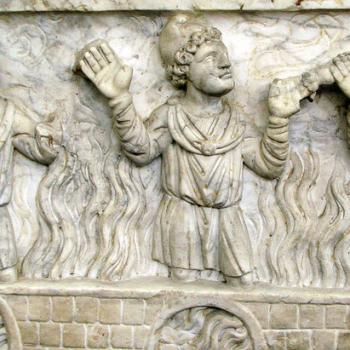
Junia: The Woman, The Myth, The Apostle
Was Junia an apostle, or did the apostles acknowledge her for her notoriety? Was Junia even a woman? Bible commentators and scholars have weighed in, but the answer to this question reveals the cultural moment regarding women’s roles in the church. How much surrounding Junia is simply a myth? Finally, what does her legend say about the equality of men and women at the highest levels of church leadership?
Teaching Junia as an Apostle
I had the privilege to teach at a local women’s gathering, exploring women of notoriety in the Bible. One taught Mary, the sister of Martha and Lazarus, and one taught the woman exemplified in Proverbs 31. I taught Junia. I opened with a simple observation. Romans 16 is often one of the most overlooked passages in the Bible. Paul’s brilliant theological arguments throughout the letter have occupied scholars and church leaders for centuries. Still, the last chapter, Paul’s Salutations, opens a window into the biographical data of his closest companions and co-workers. These bio snippets deserve a deeper dive. Teaching demands the discipline of research and beckons one into the world of the subject matter. Imagine a driving instructor whose never experienced driving a car. Teaching Junia challenged me to explore and understand the history of interpretation, the language, and the nuance surrounding the person of Junia in Romans 16:7.
The History of Interpreting Romans 16:7
Of the women of the New Testament, Junia may receive the most attention in scholarly books, commentaries and articles. Two of Junia’s primary characteristics – her gender and ministry- were up for debate for at least a millennia. According to Nijay Gupta, from the Middle Ages to the 1980s, Andronicus and Junia(s) were considered biological males. Presumably, the male name Junias – nowhere attested in the ancient world – was the shortened name for Junianus – a common male name. 1 However, the Greek name Junia – iunian is a common name widely attested in the first century. In an article for The Junia Project describing the history of interpreting this short verse, Ian Hyde attests that the name Junias found in many modern translations resulted from either bad manuscripts, Greek mistranslations, or a misreading of the text.
The Apostleship of Junia
The Greek term apostolos means to send and is used nine times in the gospels, 28 times in Acts, and 34 times in Paul’s letters. It can also mean envoy. It conveys the idea of going on a specific mission to carry forth the desires of the sender. However, the contention surrounding Junia involves the obscuring of her apostleship. She only appears in Romans 16:7, but her description speaks volumes. Paul piles on the commendations. According to the NIV translation, Paul introduces Junia and Andronicus as his fellow Jews, having served time in prison with him. They are outstanding among the apostles and were in Christ before him. Paul and Junia were ministry colleagues. So why the conundrum?
A Hierarchical Reading of the Text
Linda Belleville notes the period between the 1940s to the 1970s introduced translations of the Bible that tended to obscure Junia’s role as Paul’s ministry colleague. 2 As co-workers of Paul, Andronicus, and Junia would have had pastoral and missionary responsibilities. Many churches responded to the cultural upheaval of the 1960s, including the women’s liberation movement, by shoring up a hierarchical theology of male leadership and women’s servanthood. The 1987 Danvers Statement, written by the Council of Biblical Manhood and Womanhood, prioritized male leadership and female submission in marriage, suggesting the rise of female leaders in the church cripples the Biblical witness. The Greek prepositional phrase referring to Junia, rendered prominent among the apostles in the NRSV translation, is also rendered well-known to the apostles in the ESV. The former denotes inclusivity, and the latter denotes exclusivity.
A Historical Reading of the Text
Early Greek translations and commentaries attest to Junia’s apostleship and her unique status among the apostles. According to Gupta, early church theologians such as Chrysostom, Ambrosiaster, Origen, and Theodoret of Cyrus confirm Junia as an apostalos. Chrysostom considered Junia’s position a “high office, a status of work and ministry that belongs to only the most venerated of Christian leaders.” 3 Does verse 7 imply prominent among or well-known to? Belleville makes the grammatical case for the use of the Greek episemos renders the sense of “prominent among” by observing how the usage of en with the personal dative apostolois “bears the local meaning of “in/among.” 4
Conclusion
Biblical and historical evidence supports the early readings of Romans 16:7, which render Junia a prominent female apostle who suffered alongside Paul and was considered equal in status. However, only in the last 60 years or so do we see efforts made among Bible translators to push for readings that portray Junia as either well-known to the apostles or as the male Junias. This reading is a myth culturally biased and not based on an accurate reading of the text. The Council of Biblical Manhood and Womanhood has denied the legitimacy of women leaders in the church. This denial would limit at least half of the body of Christ. Well-qualified men and women should have equal voices to lead in the church to impact the world for Christ. Junia’s legend shows there is nothing unbiblical about that.
- Nijay Gupta, Tell Her Story: How Women Led, Taught, and Ministered in the Early Church (Downer’s Grove, Il: IVP, 2023), 142. According to Gupta, The Greek name Junia – iunian could technically be male or female.
- Ronald Pierce, Cynthia Long Westfall, and Christa L. McKirkland, Discovering Biblical Equality: Biblical, Theological, Cultural & Practical Perspectives (Downer’s Grove, Il: IVP, 2023), 77.
- Nijay Gupta, Tell Her Story: How Women Led, Taught, and Ministered in the Early Church (Downer’s Grove, Il: IVP, 2023), 145.
- Ronald Pierce, Cynthia Long Westfall, and Christa L. McKirkland, Discovering Biblical Equality: Biblical, Theological, Cultural & Practical Perspectives (Downer’s Grove, Il: IVP, 2023), 79. Bellville notes that the “compound of epi (upon) and sema (mark) yields the sense ‘having a mark, inscription,’ ‘bearing the marks of,’ and the metaphorical sense “remarkable, notable.'”
















